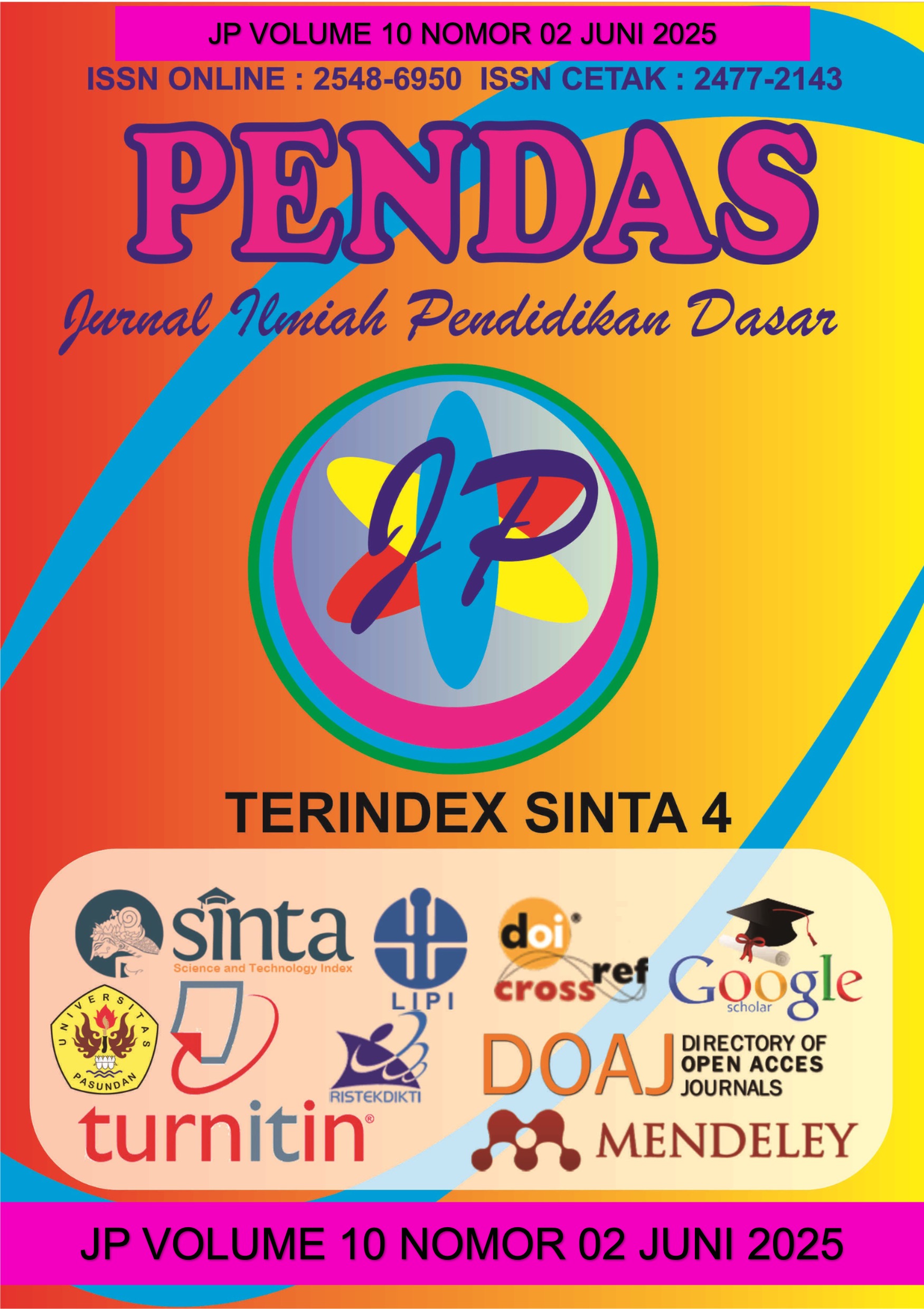PENGEMBANGAN E-LKPD BERBASIS KOMIK PADA PEMBELAJARAN IPAS DIKELAS V SEKOLAH DASAR
DOI:
https://doi.org/10.23969/jp.v10i02.25105Abstract
his research aims to develop a Comic-Based E-LKPD for IPAS learning in Class V
Elementary School that is valid, practical, and effective. The research is motivated
by the lack of use of attractive E-LKPD and teacher skills in using digital-based E
LKPD. This research uses Research & Development, and the development model
used is the ADDIE model. The results show that the developed E-LKPD has a
material validity level of 80%, media validity of 87.5%, and language validity of
82.5%. The teacher questionnaire results at SDN 01 Pasar Tiku were 93.75% in the
very practical category, while the student response questionnaire was 89.38% in the
very practical category. At SDN 14 Banda Gadang, the teacher questionnaire was
96.87% in the very practical category, and the student questionnaire was 84.61% in
the very practical category. Additionally, the research schools SDN 20 Pasar Tiku,
SDN 05 Pasar Tiku, and SDN 25 Pasir Tiku also showed positive results, with
teacher questionnaires ranging from 90.62% to 93.75% in the very practical
category, and student questionnaires ranging from 79.62% to 93.40% in the
practical to very practical category. The effectiveness results showed significant
improvements, with the first trial school SDN 01 Pasar Tiku increasing from 69.3%
to 89.9% in the very effective category, and the second trial school SDN 14 Banda
Gadang increasing from 70.8% to 90.0% in the very effective category. Similarly,
the research schools also showed improvements, with SDN 20 Pasar Tiku
increasing from 67.7% to 87.2%, SDN 05 Pasar Tiku increasing from 69.2% to
84.2%, and SDN 25 Pasir Tiku increasing from 65% to 82.9%, all in the very effective
category. Therefore, it can be concluded that the Comic-Based E-LKPD for IPAS
learning in Elementary School has been declared valid, practical, and effective.
Downloads
References
Amini, R., Handayani, S. E., Fitria, Y., Lena, S. M., & Helsa, Y. (2019). Development of Integrated Thematic Teaching Materials using Problem-Based Learning Model in Elementary School. 5th International Conference on Education and Technology (ICET 2019). Atlantis Press, 382(Icet), 442–445. https://doi.org/10.2991/icet 19.2019.111
Aryanti, Novita Sri, et al. Pengembangan Lembar Kerja Peserta Didik (LKPD) Berbasis Komik Pada Mata Pelajaran PPKN Kelas VII SMPN 3 Pendidikan Kragilan. Jurnal Kewarganegaraan, 2022, 6.1: 38-48.
Azahra, A. P., & Wasis. (2023). Pengembangan, Uji Validitas, Dan Uji Reliabilitas Instrumen Tes Diagnostik Berformat Five Tier Pada Materi Hukum Newton.
Budiningtyas, A. K., Utaminingsih, S., & Fajrie, N. (2022). Pengembangan media “pegalinu” dalam kemampuan literasi digital dan numerasi dasar kelas III di SD Segugus Wibisono Kecamatan Jati Kabupaten Kudus. Jurnal Ilmiah Wahana Pendidikan, 8(18), 1-10.
Desriyenti, R., & Gusnedi. (2020). Pembuatan LKPD Berbasis Komik Model Guided Discovery Learning Pada Materi Usaha, Energi, Momentum, Dan Impuls Kelas X SMA/MA. In Physics Education(Vol. 13, Issue 2).
Hasanah, N. (2019). Pengembangan Lembar Kerja Peserta Didik Berbasis Karakter.
Hermawan, Y. C., dkk. (2020). Konsep Kurikulum dan Pendidikan Islam. Kurikulum Jurnal MUDARRISUNA: Media Kajian Pendidikan
Hidayat, F., & Nizar, M. (2021). Model Addie (Analysis, Design, Development, Implementation and Evaluation) Dalam Pembelajaran Pendidikan Agama Islam.
Indriani, F. F., & Sakti, N. C. (2022). Pengembangan eLKPD Berbasis Komik untuk Kemampuan Meningkatkan Berpikir Kritis Peserta Didik Kelas XI IPS SMA. Jurnal PTK Dan Pendidikan, 8(1). https://doi.org/10.18592/ptk.v8i1. 6414
Jannah, I. K. J., & Suciptaningsih, O. A. (2023). Pengembangan E-LKPD berbasis CTL pada kurikulum merdeka muatan IPAS. JIIP-Jurnal Ilmiah Ilmu Pendidikan, 6(8), 61646172.
Downloads
Published
Issue
Section
License
Copyright (c) 2025 Pendas : Jurnal Ilmiah Pendidikan Dasar

This work is licensed under a Creative Commons Attribution 4.0 International License.














































